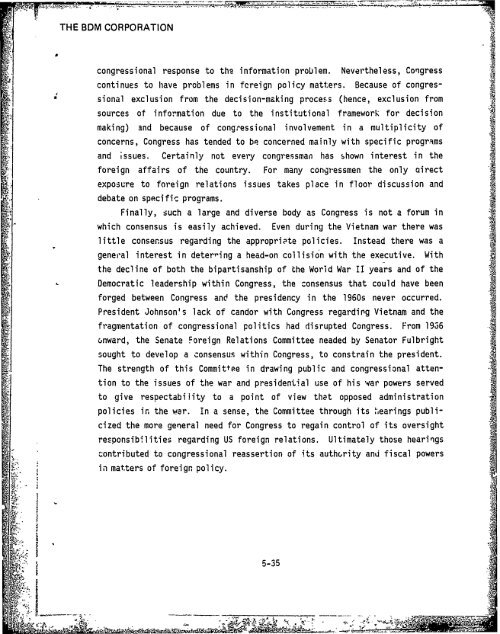policy - The Black Vault
policy - The Black Vault
policy - The Black Vault
You also want an ePaper? Increase the reach of your titles
YUMPU automatically turns print PDFs into web optimized ePapers that Google loves.
THE BDM CORPORATION<br />
congressional response to the information problem. Nevertheless, Congress<br />
continues to have problems in fcreign <strong>policy</strong> matters. Because of congressional<br />
exclusion from the decision-making proce.,s (hence,<br />
exclusion from<br />
sources of information due to the institutional framework for decision<br />
making) and because of congressional involvement in a multiplicity of<br />
concerns, Congress has tended to be concerned mainly with specific programs<br />
and issues. Certainly not every congressman has shown interest in the<br />
foreign affairs of the country. For many congressmen the only airect<br />
exposure to foreign relations issues takes place in floor discussion and<br />
debate on specific programs.<br />
Finally, such a large and diverse body as Congress is not a forum in<br />
"which consensus is easily achieved.<br />
little consensus regarding the appropriate policies.<br />
Even during the Vietnam war there was<br />
Instead there was a<br />
general interest in deterring a head-on collision with the executive.<br />
With<br />
the decline of both the bipartisanship of the World War II years and of the<br />
Democratic leadership within Congress, the consensus that could have been<br />
forged between Congress and the presidency in the 1960s never occurred.<br />
President Johnson's lack of candor with Congress regarding Vietnam and the<br />
fragmentation of congressional politics had disrupted Congress. From 1936<br />
onward, the Senate Foreign Relations Committee neaded by Senator Fulbright<br />
sought to develop a consensus within Congress, to constrain the president.<br />
<strong>The</strong> strength of this Committee in drawing public and congressional attention<br />
to the issues of the war and presidential use of his war powers served<br />
to give respectability to a point of view that opposed administration<br />
policies in the war. In a sense, the Committee through its ,.earings publicized<br />
the more general need for Congress to regain control of its oversight<br />
responsibilities regarding US foreign relations. Ultimately those hearings<br />
contributed to congressional reassertion of its authGrity and fiscal powers<br />
in matters of foreign <strong>policy</strong>.<br />
"4 1<br />
5-35<br />
~LA
















